|
It has been a few months now since I first heard
that Cimarron Firearms of Fredericksburg, Texas was going
to be selling an entry level .22 rimfire revolver that was a
close copy, at least in style, of the Colt Single Action Army,
and that it was to sell at a very low price. Cimarron is
well-known in the Cowboy Action
Shooting world as an importer of some very good replica
lever action and single shot rifles, as well as a wide variety
of replica old west revolvers. Cimarron’s guns are well
finished, and a cut above many of the replica firearms on the
market today. Their 1892
Winchester replica that I reviewed on Gunblast almost two years
ago was the slickest-working ‘92 Winchester, of any
brand, that I have ever held in my hands. I have also reviewed
many of their revolvers, and found them all to be quality
weapons with a lot of historical old west feel to them.
Back in September of this year while visiting my
friend “The Swede” in the Upper Peninsula of
Michigan, I got to play with a Cimarron Plinkerton a bit, and
have finally received one here in Tennessee for a full
evaluation. When I first held that Plinkerton in Michigan, I
didn’t think too highly of it. None of us did. We were
shooting custom Rugers built by John and Dustin
Linebaugh, Freedom Arms revolvers, and Colt
Single Actions that day, and the Plinkerton just did not fit in.
It wore a matte black finish on the metal, which appeared to be
some sort of non-ferrous alloy, and had black plastic grips
attached to the grip frame with a Phillips-head screw. The thing
that really put us off was the key-operated hammer block safety
on the upper left side of the frame, opposite the loading gate.
It just did not look right to us. However, the gun was there, it
felt pretty good in the hand, and we decided to give it a try.
Much to our surprise and delight, the sixgun shot pretty well!
It balances in the hand much like a Colt Single Action Army, and
operates much the same, loading and unloading from a half-cock
hammer position, and was pretty fun to shoot plinking at rocks
and such on a hillside across Swede’s pond.
The Plinkerton which arrived here a few days ago
is just like the one I played with in Michigan. Looking closer
at this test gun, the fit of the parts is pretty well executed,
and the trigger pull feels pretty good, measuring just under two
and one-half pounds, but having a travel of about
three-sixteenths of an inch before the sear releases to drop the
hammer. The hammer is of the traditional single action shape,
and is easy to operate. The firing pin is a large rectangular
part set vertically in the frame, and is held in place with a
cross-pin. As noted above, there is a key-operated hammer block
safety on the side of the frame, and rotating the key about
ninety degrees blocks the hammer from contacting the firing pin.
While on this subject, the Plinkerton should not be dry-fired
without a snap-cap or empty cartridge case in place, as the
firing pin can contact the rear of the cylinder. My sample gun
had been obviously dry-fired before I received it, but it
functioned just fine anyway. The barrel length on the Plinkerton
measures four and five-eighths inches, and consists of a steel
liner inside the outer tube, just like the steel chamber inserts
in the cylinder. The hard plastic grips are fully checkered, and
fit the grip frame well. The shape and size feels just like a
genuine Colt SAA grip, and a pair of Colt grips fit the
Plinkerton well, but the grip locater pin is in a different
location than on the Colt. The front sight is of the traditional
Colt profile, and the rear notch is wide, deep, and easy to use.
The sights were pretty well regulated for my style and hold on
the sixgun, and after loading and firing about three shots, I
was on target at twenty-five yards, plinking offhand at a small
steel swinging target. For accuracy testing, I locked the
Plinkerton in my Ransom Rest,
using the Colt Single Action Army grip insert. Accuracy and
velocity testing was done on an overcast day, with an air
temperature of thirty-nine degrees Fahrenheit, a light wind, and
an elevation of about 550 feet above sea level. The
chronograph’s electronic eyes were set at twelve feet from the
muzzle, and velocities in the chart below are listed in
feet-per-second (fps). HP is hollowpoint ammo. Bullet weights
are listed in grains. Group sizes are for five-shot groups fired
at a distance of twenty-five yards, and group sizes are listed
in inches, center-to center for the widest spaced shots in the
group.
| AMMUNITION |
BULLET WEIGHT |
VELOCITY |
ACCURACY |
| Winchester Xpert HP |
36 |
955.1 |
4.125 |
| Winchester Dynapoint |
40 |
914.5 |
3.75 |
| Federal Bulk HP |
36 |
1010 |
4.00 |
| CCI Mini Mag Solid |
40 |
982.1 |
3.625 |
| Federal Spitfire HP |
34 |
1054 |
4.25 |
| Federal Hi Power Solid |
40 |
1008 |
2.825 |
| PMC Match Solid |
40 |
853.3 |
3.50 |
| Winchester Wildcat Solid |
40 |
915.6 |
4.375 |
| PMC Zapper HP |
36 |
1025 |
2.06 |
| Remington Cyclone HP |
36 |
976.7 |
3.25 |
Accuracy was pretty good with a couple of loads,
and satisfactory for plinking with most others. All groups were
pretty tight horizontally, but were dispersed vertically. Those
types of patterns on the target are usually indicative of
velocity variations, and the chronograph readings showed this to
be the case. The barrel/cylinder gap varied from a nice, tight
two one-thousandths (.002) of an inch to six one-thousandths
(.006), depending upon which chamber was measured. None of these
measurements was excessively large for a gun of this type, but
the variation did cause the vertical group dispersion, hurting
the overall accuracy performance of the sixgun. However, as the
name implies, this gun is built to be an inexpensive plinker,
and it performs in that role very well. The Plinkerton feels and
handles pretty much like a Colt SAA or replica thereof, fires
inexpensive .22 Long Rifle ammunition, and functioned one
hundred percent reliably throughout my tests. I experienced no
misfires, and every empty case ejected positively. Loading and
unloading was easy, and the chambers line up perfectly with the
ejector rod at each “click”. The Plinkerton weighs 39.6
ounces empty, and balances well for quick handling.
The Plinkerton is not a highly polished and
richly finished revolver, nor was it intended to be. You
will likely never see one fully hand engraved and wearing carved
ivory grips. However, the Plinkerton fills a role that needs
filling, as a very affordable to purchase and affordable to
shoot rimfire plinker. Hopefully, the authorities of the Cowboy
Action Shooting games will start to allow .22 rimfire guns for
competition. Most CAS competitors shoot powder puff loads
anyway, and allowing these Plinkerton revolvers to compete would
get an entry level shooter in who might not otherwise be able to
afford to do so. As of this writing in December of 2008, the
suggested retail price of the Plinkerton is only $189 US as
reviewed here, and only twenty dollars more with the extra .22
Magnum cylinder. As my cousin Debbie would say. “Now
that’s a deal!”
Check out the extensive line of Cimarron
firearms and accessories online at www.cimarron-firearms.com.
Jeff
Quinn
|
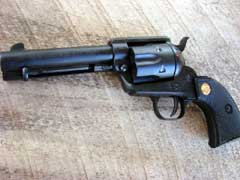
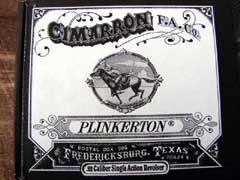
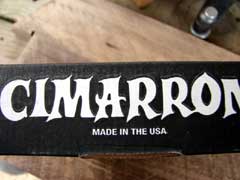
Cardboard box has an Old-West look.
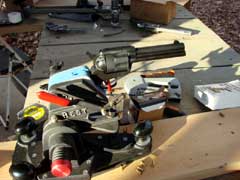
Accuracy testing was done is a Ransom Master Series
Machine Rest.
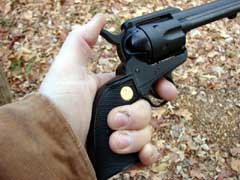
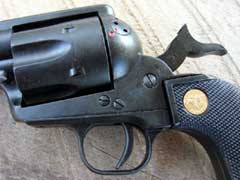
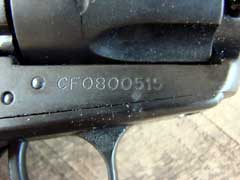
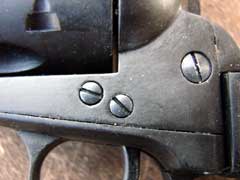
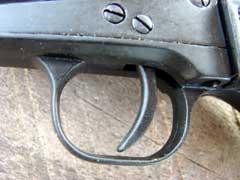
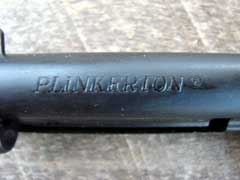
|
  
Got something to say about this article? Want to agree (or
disagree) with it? Click the following link to go to the GUNBlast Feedback Page.
|
|
Click pictures for a larger version.
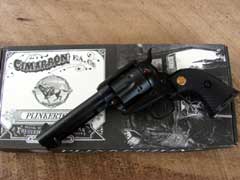
Cimarron's "Plinkerton" .22 sixgun.
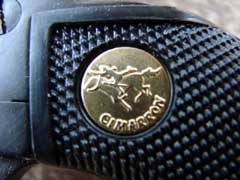
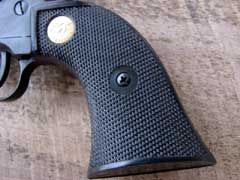
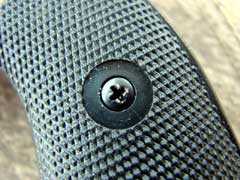
Checkered hard plastic grips.
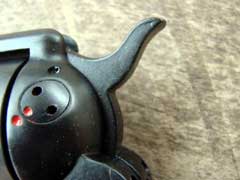
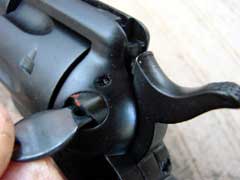
Key-operated hammer-block safety.
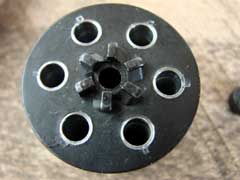
Cylinder is lined with steel chamber inserts.
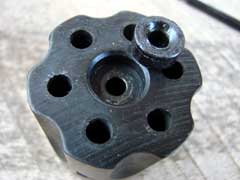
Front of cylinder sports a removable bushing.
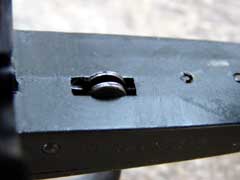
Cylinder bolt.
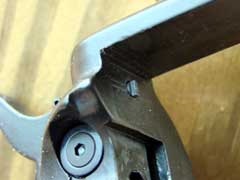
Large rectangular firing pin.
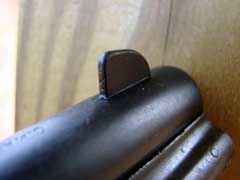
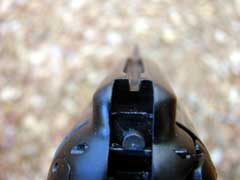
Sights are fixed, in the familiar Old-West style.
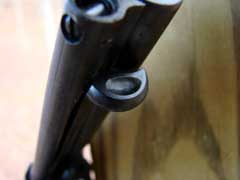
Large, easy to use ejector rod head.

Large rectangular firing pin.
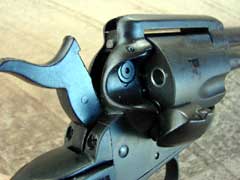
Hammer is placed on half-cock to load.
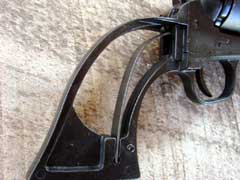
Hammer spring is of the traditional leaf style.
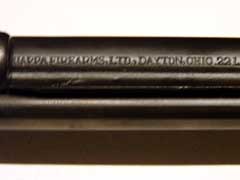
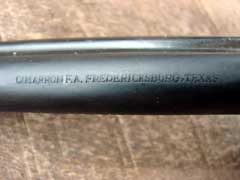
|
![]()